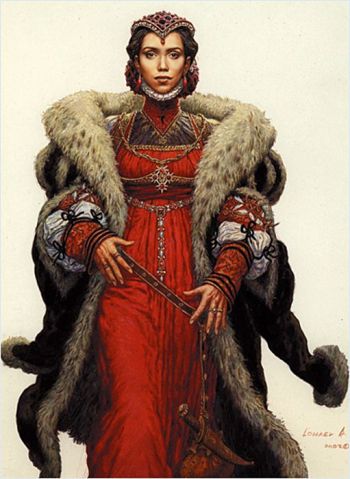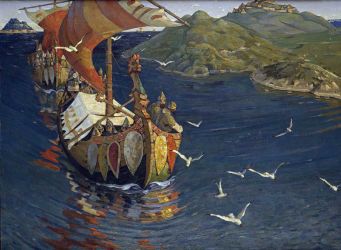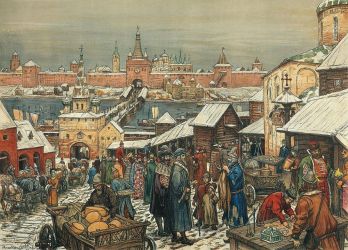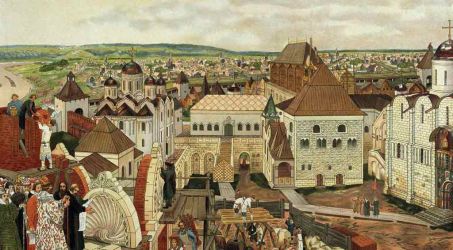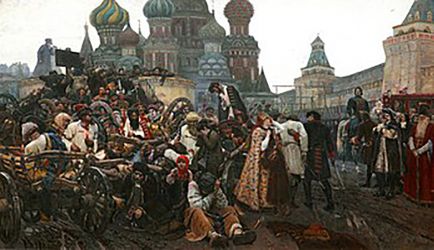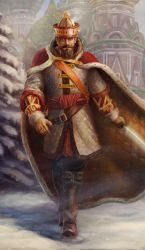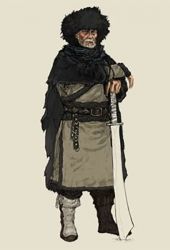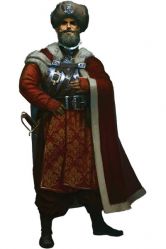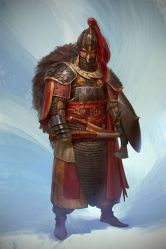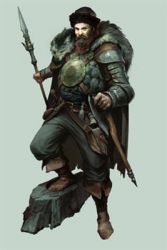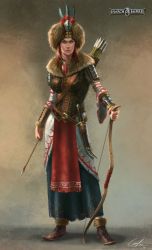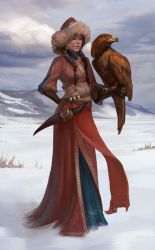Changes: Sim Layout, City-States, RPCSS Factions, and Storyline. Read More
Difference between revisions of "Rusavik"
From The Citadel
| Line 18: | Line 18: | ||
; Traditions | ; Traditions | ||
| − | Rusavik has two primary gods, a wide variety of local gods, and any number of household spirits. Grom is the thunder god who rules the two storm seasons between summer and winter. Grom is also the god of rain, the winds, eagles, weapons, law, and the sun. Grom, unlike his enemy Berek, | + | Rusavik has two primary gods, a wide variety of local gods, and any number of household spirits. Grom is the thunder god who rules the two storm seasons between summer and winter. Grom is also the god of rain, the winds, eagles, weapons, law, and the sun. Grom, unlike his enemy Berek, is both admired and feared. Most of the great sacrifices are made during the spring and fall to Grom with the hope that he will be pleased with the people and keep the storms from their homes. Rus heroes are burned on pyres with the hope that they will be taken into the sky and become gods themselves. It is said that if a storm comes during the burning of a hero it is a sure sign that he was accepted by Grom. |
Berek the Bear-God on the other hand was considered a companion of the people and the enemy of Grom. Berek is the god of the sea and land, and all flora and fauna upon or within it, as well as the moon and the mountains. In this way, Berek was also the god of fertility and death. Those who did not lead a heroic life, which was most of the population, would be buried in the earth or given to the sea where it is hoped they will be allowed to reincarnate. Berek has no divine wife, though there are ancient stories of how he was once married to the Goddess Berta, also known as Old Mother Frost. It is commonly told that the Halbergs stole her and brought her back to their home and since than Berek has been searching for a wife, and takes a new bride at the end of spring for the whole of the summer. In this way, has come the tradition of taking summer spouses -- summer long “marriages” that are considered acceptable among both the old, the young, the married, and unmarried. | Berek the Bear-God on the other hand was considered a companion of the people and the enemy of Grom. Berek is the god of the sea and land, and all flora and fauna upon or within it, as well as the moon and the mountains. In this way, Berek was also the god of fertility and death. Those who did not lead a heroic life, which was most of the population, would be buried in the earth or given to the sea where it is hoped they will be allowed to reincarnate. Berek has no divine wife, though there are ancient stories of how he was once married to the Goddess Berta, also known as Old Mother Frost. It is commonly told that the Halbergs stole her and brought her back to their home and since than Berek has been searching for a wife, and takes a new bride at the end of spring for the whole of the summer. In this way, has come the tradition of taking summer spouses -- summer long “marriages” that are considered acceptable among both the old, the young, the married, and unmarried. | ||
Revision as of 19:16, 13 January 2021
A blend of Bear Island (Game of Thrones), The Rus People of Western Russia.
The Great City of Rusavik lies on the northeastern coast of Essealas in the lands that the northerners call “East of the Sun and West of the Moon”, and the southerners call “Ice and Storm”. Like most of the northern city-states, Rusavik roosts high upon its expansive and sprawling fjords. From the city gates, a brilliant red tundra rolls down to meet the thick swathe of the central Essaelasian wilderness.
Rusavik is a beautiful city of curving white stone streets that slither erratically upward from multi-tiered log buildings to the white plaster and red tile structures of the central city. These grand structures, capped with palatial buildings composed of large colorful domes, painted walls, and curved supports do naught but exalt the city’s beauty. It is said that even the people of far-off Arjat are impressed by the artistry of Rusavik. It is even speculated, that there is a shared ancestry between the two cities.
The day to day lives of the Rus involves little farming. They are known to only harvest enough to bolster their winter stores. Primarily, they are shepherds or fishmongers -- known well for their winter fishing skills. When the harsh winds of winter come, and the Alfarians pull their ships close to the harbor, the Rus are ready for another season of the sea. They repair and fashion ships specially designed to navigate the broken ice channels of the high fjords; hunting the great golden sturgeon.
- Personality
The Rus come with mainly two dominant personalities; dour and gregarious, and very little in between. Further, it is not at all uncommon for a Rus to gravitate between the two when the situation requires it. They have what might be called a fatalistic attitude and expect the worst, while still exuding an optimistic demeanor in the face of pending doom. They have a love of desserts, strong drinks, and conspiracy theories. Most of the city-state, including the nobility, are generally engaged in some form of business or trade.
The Rus are known to be brutally honest in regard to their feelings while dually devious and cunning in regards to their mercantile and political endeavors. They have a strong distrust of Jurchen who not so long ago sacked the city and dealt great damage to its infrastructure. Their relations with the Alfarians are admirable and for the most part quite peaceful. The Rus tend to share many of the common traits with Halsteins who they usually find unendurably boring.
The Rus are both traders and expansionists. If they can bring anything under their control or influence they will.
- Appearance
The average Rus is unusually tall with dark hair, dark eyes, and swarthy skin. However, it is not uncommon to see Rus with either Mongolian features from their western neighbor Jurchen or the pale skin and hair of their eastern neighbors, the Alfarians. The Rus favor fur and brightly colored brocade coats worn over long tunics or gathered trousers. Fur hats, upturned boots, white dresses/tunics with red stitching are a common tradition of most Rus outfits.
- Traditions
Rusavik has two primary gods, a wide variety of local gods, and any number of household spirits. Grom is the thunder god who rules the two storm seasons between summer and winter. Grom is also the god of rain, the winds, eagles, weapons, law, and the sun. Grom, unlike his enemy Berek, is both admired and feared. Most of the great sacrifices are made during the spring and fall to Grom with the hope that he will be pleased with the people and keep the storms from their homes. Rus heroes are burned on pyres with the hope that they will be taken into the sky and become gods themselves. It is said that if a storm comes during the burning of a hero it is a sure sign that he was accepted by Grom.
Berek the Bear-God on the other hand was considered a companion of the people and the enemy of Grom. Berek is the god of the sea and land, and all flora and fauna upon or within it, as well as the moon and the mountains. In this way, Berek was also the god of fertility and death. Those who did not lead a heroic life, which was most of the population, would be buried in the earth or given to the sea where it is hoped they will be allowed to reincarnate. Berek has no divine wife, though there are ancient stories of how he was once married to the Goddess Berta, also known as Old Mother Frost. It is commonly told that the Halbergs stole her and brought her back to their home and since than Berek has been searching for a wife, and takes a new bride at the end of spring for the whole of the summer. In this way, has come the tradition of taking summer spouses -- summer long “marriages” that are considered acceptable among both the old, the young, the married, and unmarried.
The symbol of the religion is a bearded ax amulet worn by nearly every member of the region.
- Expanded Lore
- Further reading and links for the culture obsessed.
Small Council NPCs
| Role | Description |
|---|---|
| Artur Borisovich Ruler |
|
| Isaak Petrovich Diplomat |
|
| Oleh Horbach Warlord |
|
| Zhanna Yanchuk Coinmaster |
|
| Silayeva Yakovna Spy Master |
Phrases
- Stormborn
- Refers to a person born during a storm, or one who is expected to do great things.
- In the Stormlands
- Is a way of referring to Rusavik such as, "nothing will ever be the same again in the stormlands", or "a dark dread hung over the stormlands."
- Berserker
- A person who is believed to turn into a bear during combat, typically they mean bear like, or having a bear spirit. (Please note we do not actually allow shapeshifters.)
Terms and phrases associated with this city-state will develop during role-play. If you would like to submit a phrase you use regularly please DM Branwyn.Emerald
